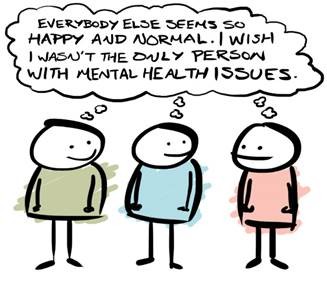Viewpoint: Let’s Talk Mental Health, UWL
January 28, 2018
Mental illness impacts many people, but the main demographic that is impacted is college aged students. According to the Anxiety and Depression Association of America, “Forty million US adults suffer from an anxiety disorder and seventy-five percent of them experience their first episode by the age of twenty-two.” The article then states, “Forty one percent of college students stated that anxiety is the top presenting concern among mental health issues and twenty four percent of college students reported they were taking psychiatric medication.”
Although anxiety is the most relevant in college aged students, depression, obsessive compulsive disorder, dissociative disorder, eating disorders, etc. are all impacting this demographic at a higher rate than any other group. Why is this? To ponder this question, you must first ask yourself, why is mental health uncomfortable to talk about?
If there is something physically wrong with us, such as a broken bone, it is difficult to hide. You will need extra assistance, people to lean on for support. If you have something that is mentally wrong with you it is not as transparent.
Unless you show all of the by-the-book symptoms and say the words, “I suffer from insert disorder*” no one in your life will most likely notice. Mental illness goes unnoticed. It is hard to be sick but not always ‘look’ sick.
The main reason why people do not discuss mental illness is because they feel like no one else is suffering from the same issues (Center for Disease and Control). When we are taught in middle school health about mental illness it is generalized and taught as the most isolating disorder. Beyond depression and anxiety, no other mental illnesses are discussed, nor are they normalized. When you are taught that mental health is not as important as physical health, you minimize your attention to mental health because as long as you look ok you are ok.
It is very easy to say you understand mental health, but it is much harder to be a mental health advocate and ally. In order to be an ally, you must talk to your friends, family, and those around you about their mental health. Be a familiar face in an unfriendly crowd, lend a hand to someone you do not usually talk to, start conversations about mental illness instead of letting the questions be unanswered. Until you break the barrier between mental and physical health you will always seem them as divided. Health is health, and we should all feel at our best as much as we can.
If you yourself suffer from a mental illness and need assistance please reach out to University of Wisconsin – La Crosse counseling and testing center, the office of multicultural student services, or campus climate. At UWL we pride ourselves on discovery, it is time to pride ourselves in discovering the ability to ask for help.







